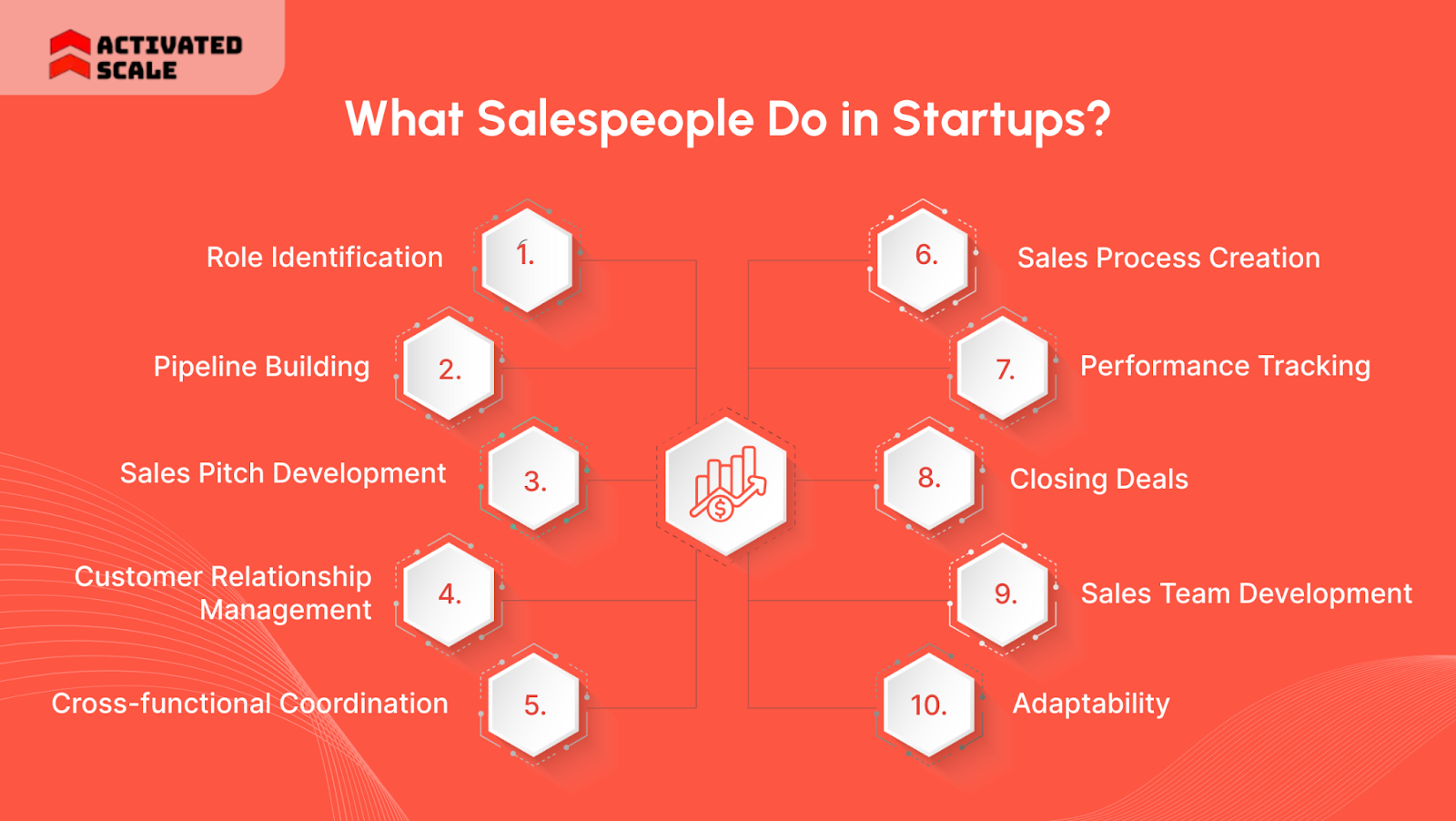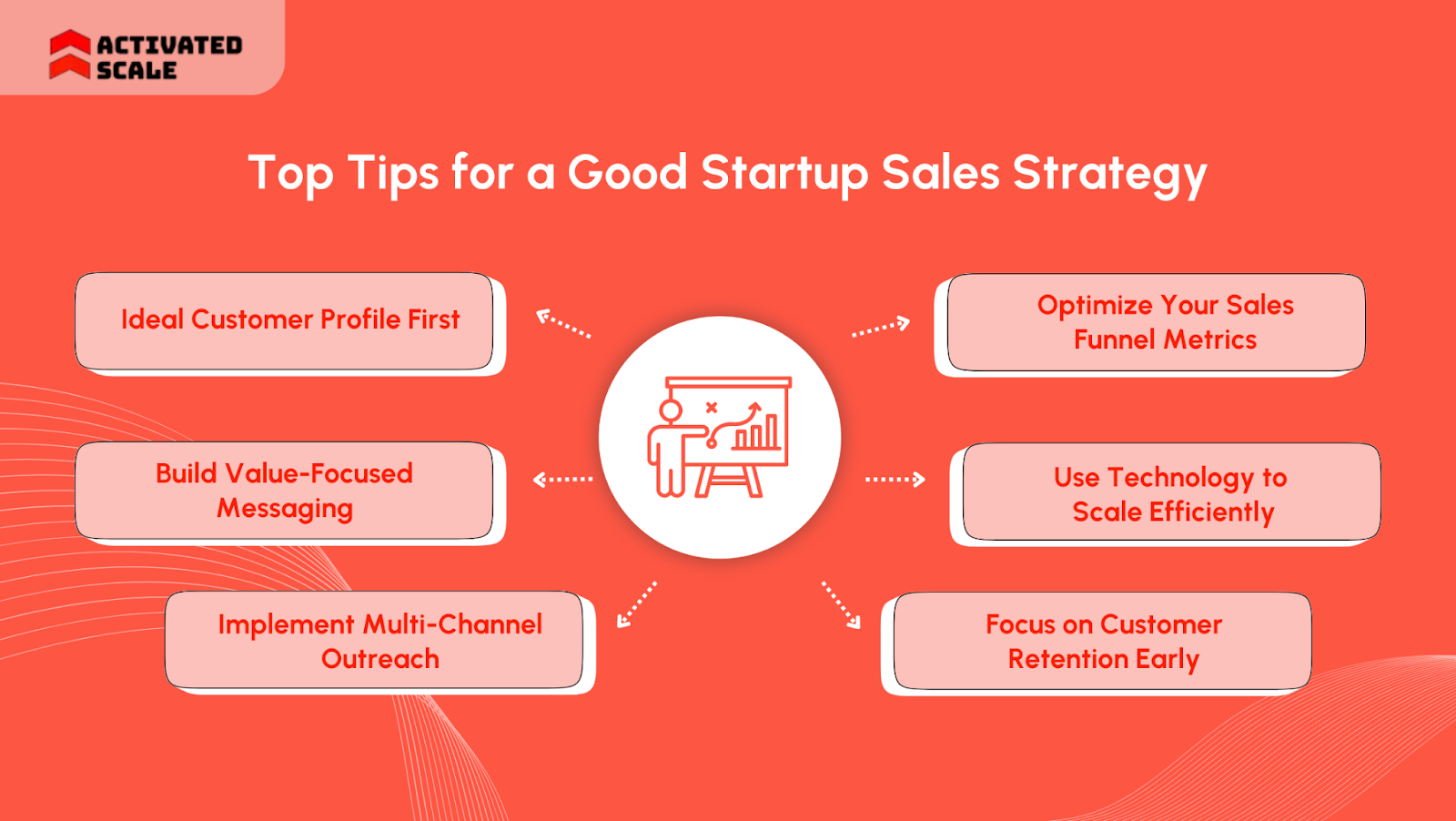Hiring a strong sales team for startup sales is one of the toughest challenges founders and leaders face. Finding skilled sales professionals who understand early-stage market uncertainties takes time and careful effort. Couple that with limited budgets and high turnover risks, and building that first, or expanding the sales team, often feels more like trial and error than a strategic process.
Yet, startup sales success depends heavily on the right people driving growth and customer connections every day. The limitations don’t stop at hiring; preparing a clear sales strategy for startups that adjusts to growing buyer needs and product changes is equally crucial.
In this guide, practical startup sales tips and approaches will be opened to help strengthen and grow a sales engine built for real-world startup complexities.
Key Takeaways
- Startup Sales Requires Flexibility: Startup sales demand agility, with sellers multitasking, adjusting pitches, and iterating processes to discover effective, repeatable methods for early-stage growth.
- Value Messaging Over Features: Successful startups emphasise solving customer problems, highlighting measurable outcomes over product features to gain trust, support, and conversions.
- Outsourcing Carries Both Speed and Risk: Outsourced sales speed market entry and cut costs, but risk poor brand alignment, weaker oversight, and inconsistent customer interactions if unmanaged.
- Funnel Metrics Drive Predictable Revenue: Monitoring conversion rates and pipeline velocity helps startups identify bottlenecks, refine processes, and reliably forecast future revenue performance.
- Fractional Sales Talent De-Risks Hiring: Fractional SDRs and AEs allow startups to scale quickly, reduce hiring risks, and access experienced sales talent without long-term commitments.
What is Startup Sales?
Startup sales refers to the unique process of selling products or services within a new or early-stage company. This involves building sales strategies from scratch to attract initial customers, validate product-market fit, and generate sustainable revenue. Startup sales focus on direct customer interaction to gather feedback that shapes product development and sales approaches.
Unlike established companies, startup sales teams usually operate with limited resources, a small team, and a high degree of flexibility to find what works for their specific offering.
What Salespeople Do in Startups?

Here’s a look at key activities that define their role:
- Role Identification: Define the ideal customer profile and constantly refine it, based on direct feedback and market testing, to increase sales effectiveness.
- Pipeline Building: Develop lead generation tactics often without established processes or extensive marketing support, adjusting quickly to growing customer needs.
- Sales Pitch Development: Customize communication for each prospect to clearly demonstrate the value proposition of a new or unproven product.
- Customer Relationship Management: Establish trust and build long-term sales engagements despite limited brand recognition or social proof.
- Cross-functional Coordination: Work closely with product, marketing, and customer success teams to relay customer insights and shape product features.
- Sales Process Creation: Design and iterate sales workflows and playbooks as the startup matures, balancing trial and error to establish repeatable methods.
- Performance Tracking: Monitor key metrics such as conversion rates and sales cycles to identify bottlenecks and improve team output.
- Closing Deals: Focus intensely on converting early prospects to paying customers, often requiring persistence and flexibility given product uncertainties.
- Sales Team Development: For senior roles, recruit, onboard, and mentor new sales hires while developing scalable sales strategies and budgets.
- Adaptability: Handle multiple roles and tasks, from cold outreach to closing, often working without the structure or resources available in larger firms.
Finding the right first hire can make or break your growth. Avoid common slip‑ups by checking out 5 Mistakes You Are Making When Hiring a Salesperson For Your Startup.
How Does Startup Sales Differ from Enterprise Sales?
Startup sales and enterprise sales ask very different things from their sellers. While startups move quickly with fewer layers, larger organisations rely on clear structures and long-term ties. Here’s a straightforward look at how these two sales types compare across key areas.
Talking to your best prospects starts by listening first, and getting real insights through Interviews with your ICP.
Top Tips for a Good Startup Sales Strategy

Getting startup sales right means exceeding hope and guesswork with practical steps that fit your organisation’s pace and resources. It’s about clear priorities and steady progress rather than elaborate plans. Here are key tips to build a good startup sales strategy that works.
1. Define Your Ideal Customer Profile First
Create precise customer profiles before launching sales efforts. This foundational step prevents wasted resources and misdirected outreach.
Key Startup Sales Strategy:
- Research target demographics: Identify company size, industry verticals, and budget ranges that match your solution perfectly.
- Map buyer personas: Document specific pain points, goals, and communication preferences of key decision-makers.
- Validate customer fit: Use data from initial sales to refine and narrow your focus on the highest-converting segments.
2. Build Value-Focused Messaging
Shift from feature-heavy pitches to value-driven conversations that address specific customer problems.
Key Startup Sales Strategy:
- Problem identification: Reference specific challenges your prospects face rather than generic industry issues.
- Quantifiable outcomes: Present concrete results from similar customers, including percentages and dollar amounts when possible.
- Social proof integration: Use customer testimonials and case studies throughout your sales process to build credibility.
3. Implement Multi-Channel Outreach
Coordinate touchpoints across email, phone, social media, and content to maximize prospect engagement.
Key Startup Sales Strategy:
- Email sequences: Deploy automated follow-up campaigns with personalized messaging based on prospect behavior.
- Social selling: Use LinkedIn and industry platforms to build relationships before making direct sales pitches.
- Content distribution: Share relevant resources and insights across multiple channels to establish thought leadership.
4. Optimize Your Sales Funnel Metrics
Track and improve conversion rates at each stage to identify bottlenecks and growth opportunities.
Key Startup Sales Strategy:
- Stage-specific tracking: Monitor lead-to-MQL (avg. 25-35%), MQL-to-SQL (avg. 13-26%), and SQL-to-opportunity (avg. 50-62%) conversion rates.
- Pipeline velocity: Measure how quickly prospects move through each sales stage to identify delays.
- Revenue forecasting: Use funnel data to predict monthly and quarterly sales performance accurately.
Activated Scale provides fractional sales leaders who specialize in funnel optimization and performance measurement for growing companies.
5. Use Technology to Scale Efficiently
Implement CRM systems and sales automation tools to handle increased lead volumes without proportional staff increases.
Key Startup Sales Strategy:
- CRM integration: Centralize all prospect data, communication history, and deal progress in one accessible system.
- Automated workflows: Set up triggers for follow-up reminders, lead scoring, and task assignments to prevent opportunities from falling through.
- Performance analytics: Generate reports on team activity, conversion patterns, and revenue trends to guide strategic decisions.
6. Focus on Customer Retention Early
Build retention strategies from your first customer to maximize lifetime value and generate referral opportunities.
Key Strategy:
- Onboarding optimization: Create structured processes to help new customers achieve quick wins with your product.
- Success measurement: Track customer health scores and usage patterns to identify at-risk accounts proactively.
- Expansion opportunities: Monitor customer growth to identify upselling and cross-selling moments throughout the relationship.
Is it Good for Startups to Outsource Their Sales Team?

When a startup considers how to handle sales, the option to outsource can seem like a straightforward shortcut or a cautious gamble. It’s a choice that touches on costs, control, and the subtle ways customers connect with a company. Here are key points to weigh when thinking about outsourcing startup sales.
- Cost Efficiency: Outsourcing startup sales cuts fixed expenses like salaries, benefits, and training, offering flexible scaling based on workload and market needs.
- Access to Expertise: External sales teams bring diverse selling skills and experience, beneficial when internal sales processes are still developing or undefined.
- Speed to Market: Outsourcing enables faster market entry by using established sales professionals, avoiding delays from hiring and training in-house staff.
- Focus on Core Functions: Founders and internal teams can concentrate on product development and customer satisfaction without the distraction of building a sales team.
- Brand Alignment Risks: External teams may struggle to fully represent the startup’s culture and brand voice, causing inconsistencies in customer engagement.
- Communication Barriers: Coordination between internal staff and outsourced sales can introduce delays or misunderstandings, affecting customer experience.
- Control Limitations: Outsourcing limits direct oversight on sales tactics, potentially leading to misaligned sales approaches and customer interactions.
- Customer Comfort Concerns: Prospects may prefer dealing with internal representatives and feel uneasy interacting with third-party sales agents.
- Variable Quality: The reliability and performance of outsourced teams can vary widely; rigorous vetting and ongoing monitoring are important for consistent results.
- Integration Challenges: External sales teams might have difficulty syncing with developing internal processes, impacting lead follow-up and feedback loops.
Let Activated Scale Fuel Your Startup’s Sales Team Expansion
Activated Scale connects startups with vetted fractional sales professionals, offering flexible access to experienced SDRs, Account Executives, and VPs of Sales to grow sales swiftly without full-time hires.
- De-Risk Hiring: Engage fractional SDRs, AEs, and VPs of Sales to increase sales capacity without committing to full-time employees or long-term contracts.
- Proven Talent Pool: Access salespeople experienced in your buyer’s industry and ACV, ensuring alignment with your market and business stage.
- Fast Connection: Get matched with qualified fractional sales talent in less than 7 days, sometimes within 48 hours, speeding up your sales launch.
- Scalable Sales Support: Begin with part-time sales pros, who can grow with your company, acclimating to changing sales volume and targets.
- Hands-On Onboarding: Fractional sales experts get a quick ramp-up involving company, product, and buyer knowledge, enabling immediate outbound prospecting.
- Outbound Sales Focus: Activate tested sales messaging via email, cold calls, and LinkedIn to book meetings and generate opportunities efficiently.
- Revenue Growth: Fractional sales professionals accelerate pipeline build and close deals, often improving meeting rates and deal sizes.
- Trusted by Startups: Hundreds of companies rely on Activated Scale for reliable fractional sales hires to build and scale their sales functions.
- Risk-Free Model: Trial sales talent before full hire, enabling the right fit for your startup sales needs without costly hiring mistakes.
In Conclusion
Building a successful startup sales team presents unique challenges that many companies don’t fully anticipate. Miscommunication, unmet expectations, and unforeseen costs can quietly slow down sales momentum if not addressed early. Recognizing these potential pitfalls lets you create a smoother path for your sales efforts.
Activated Scale connects startups with thoroughly vetted, US-based sales professionals who know your industry well. Their flexible approach helps grow your sales capacity quickly, avoiding long hiring processes and excessive overhead. Transparent pricing, fast onboarding, and ongoing support mean fewer surprises as you scale your startup sales team.
Book a consultation today to learn how they can help power your startup's sales growth.
FAQs About Startup Sales
1. How do startup sales differ when the product is unproven?
Startup sales often involve educating the market on a novel product, requiring reps to focus heavily on demonstrating value and handling skepticism directly.
2. What role does feedback from early customers play in shaping startup sales?
Customer interactions in startup sales guide adjustments in messaging, targeting, and product features to better fit market needs and improve close rates.
3. Why is flexibility more critical in startup sales than in mature companies?
Startup sales teams frequently pivot strategies and tactics to respond quickly to market signals, testing what messaging and channels yield results.
4. How does hiring fractional sales talent impact startup sales operations?
Fractional SDRs and AEs help startups scale sales capacity without full-time hire commitments, offering agility and cost control while accessing specialized skills.
5. What common pitfalls delay the startup sales process development?
Startups often lack a formalized sales process early on, causing inconsistent follow-ups, poor lead management, and missed opportunities to establish repeatable sales workflows.
The Ultimate Guide to Hiring a Salesperson!
Get the step-by-step guide to hiring, onboarding, and ensuring success!
_edi.png)




